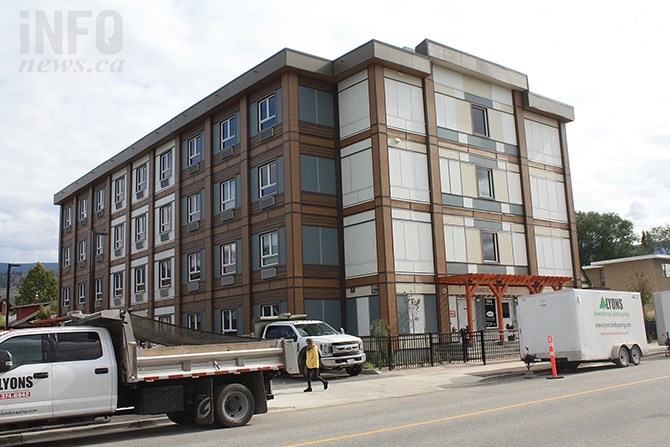
Several new affordable housing developments such as Burdock House, shown above on Winnipeg Street in Penticton, is changing the landscape for the homeless and near-homeless in the city.
(STEVE ARSTAD / iNFOnews.ca)
October 31, 2019 - 7:00 PM
With cold weather coming on, Penticton’s homeless will be increasingly looking for a place to head indoors for some warmth and shelter.
United Way Southern B.C. Community Investment Manager and 100 More Homes Penticton spokesperson Jude Brunt says much is being accomplished in Penticton to alleviate the needs of the homeless, but there is still much to be done.
The city has seen a population of 150 to 180 homeless in recent months, but Brunt says the true number of those ‘precariously housed’ could be hundreds more.
“Visible numbers are dropping with winter coming on, as people find friend’s floors, spare rooms, cars, etc. to sleep in,” she said in a recent email. “The numbers facing housing unaffordability and losing their homes due to a variety of circumstances continues to grow."
Since 2017, 100 Homes Penticton (now known as 100 More Homes Penticton) has assisted 209 people find housing through the organization’s collaboration with other societies and government agencies.
There have been some failures in the general success, with street people returning to the streets, but Brunt says more capacity is needed for courses such as RentSmart offered by South Okanagan Brain Injury Society as well as temporary rent subsidies and other initiatives to ensure those in poverty don’t lose their housing because of an inability to make a rent payment.
As winter approaches, the city has 30 beds at Compass House available, up from 16 a year ago. It is also the cold weather shelter, which is open Nov. 1 to March 31 and has expanded by an additional 20 beds, with mats also available for overflow nights.
Brunt points to the progress being made in Penticton on the new housing development front, with the recent construction of affordable housing for seniors, women and children fleeing abuse and the chronically homeless. She says collaboration between organizations is essential, but solutions don’t happen overnight.
“It may sometimes appear to others homeless (people) are on the street of their own making, but 80 per cent of those living on the streets have experienced more trauma in their early life than most can ever imagine. It is a human caused problem and we are all in this together to solve,” she says.
To contact a reporter for this story, email Steve Arstad or call 250-488-3065 or email the editor. You can also submit photos, videos or news tips to tips@infonews.ca and be entered to win a monthly prize draw.
We welcome your comments and opinions on our stories but play nice. We won't censor or delete comments unless they contain off-topic statements or links, unnecessary vulgarity, false facts, spam or obviously fake profiles. If you have any concerns about what you see in comments, email the editor in the link above.
News from © iNFOnews, 2019